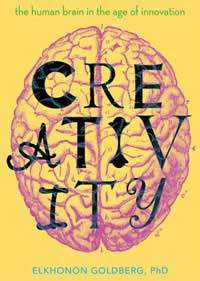 224 pages
224 pages7 CE credits
Course Enrollment
$190.00
Add to Cart
All exams are taken online. The exam for this course will be available in "My Courses" immediately upon enrollment. Note the book is not included.
The book is available for purchase from Amazon.
As an Amazon Associate we receive a rebate from qualifying purchases.
CREATIVITY
The Human Brain in the Age of Innovation
Elkhonon GoldbergOxford University Press, 2018
DESCRIPTION
What is the nature of human creativity? What are the brain processes behind its mystique? What are the evolutionary roots of creativity? How does culture help shape individual creativity? Creativity: The Human Brain in the Age of Innovation by Elkhonon Goldberg is arguably the first ever book to address these and other questions in a way that is both rigorous and engaging, demystifying human creativity for the general public. The synthesis of neuroscience and the humanities is a unique feature of the book, making it of interest to an unusually broad range of readership. Drawing on a number of cutting-edge discoveries from brain research as well as on his own insights as a neuroscientist and neuropsychologist, Goldberg integrates them with a wide-ranging discussion of history, culture, and evolution to arrive at an original, compelling, and at times provocative understanding of the nature of human creativity. To make his argument, Goldberg discusses the origins of language, the nature of several neurological disorders, animal cognition, virtual reality, and even artificial intelligence. In the process, he takes the reader to different times and places, from antiquity to the future, and from Western Europe to South-East Asia. He makes bold predictions about the future directions of creativity and innovation in society, their multiple biological and cultural roots and expressions, about how they will shape society for generations to come, and even how they will change the ways the human brain develops and ages.
EDUCATIONAL OBJECTIVESThe reader will be able to:
• Recite the links among hyper-religiosity, virtual reality, and temporal-lobe epilepsy
• Explain how dynamic network connectivity drives creativity
• Demonstrate how directed wandering takes over and produces the creative moment
• Relate how these complex functions arise from the interplay among many brain structures
• Identify functions of salience, novelty, the ability to relate old knowledge to new problems, generativity, and mental flexibility and relate them to creativity
• Explain brain mapping of agnosias, apraxias, anomias and aphasias
• Define the term 'isomorphic gradients' in regards to creativity
AUTHOR
Elkhonon Goldberg, PhD, ABPP, is a scientist, clinician, and educator. He is Director of Luria Neuroscience Institute and Clinical Professor in the Department of Neurology, NYU School of Medicine. Goldberg is internationally renowned for his research in cognitive neuroscience and clinical neuropsychology. He has authored several widely acclaimed books which have been translated into many languages. Goldberg is also a clinician with an active practice in neuropsychology
EDITORIAL REVIEWS"Countless contributions have dealt with the psychological, socio-cultural, cognitive, evolutionary aspects of creativity. The neuroanatomical and physiological aspects have been explored to a limited extent: which is odd, as creativity is the product of brain"s activity. Elkhonon Goldberg"s book has the brain as its undisputed main character; this makes it uniquely important. The role of the brain"s physiology and anatomy in the generation of creativity, with the frontal lobe and the prefrontal cortex in the privileged position, are discussed exhaustively and masterfully. Goldberg is a first rate neuroscientist and a born writer."
-- Ernesto Carafoli, MD, Venetian Institute of Molecular Medicine, University of Padova, Italy
"In Creativity, Elkhonon Goldberg is subtle, judicious, relentlessly curious, fun and brutally honest about what neuroscience knows, and doesn"t know, about the subject. He guides us through decades of research, to show that perhaps the most striking thing about our plastic organ of creativity, is that, while there are certain basic patterns in the creative brain, they are only starting points; the brains circuitry, being so plastic, likely has just as many different ways of helping to produce creative states, as there are human ways of being creative. No one interested in the neuroscience of creativity can afford to miss this book."
-- Norman Doidge, MD, author of The Brain That Changes Itself, and The Brain"s Way of Healing, Toronto, Canada
"Dr. Goldberg has obviously travelled extensively and his observations and experiences seem like a beautifully written journey in themselves until he leads one to the point where he reveals even more involving aspects of creativity in other cultures and even species. As far as this book is concerned, Dr. Goldberg clearly knows what he"s doing when it comes to Creativity."
-- John Fawcett, Creative Director, Balucate, Sydney, Australia
"What an inspired marriage of Creativity and Neuroscience (big C, big N), officiated by a brave scientist and original thinker. This book will spark new research, new toolkits, new conversations--and much creativity."
-- Alvaro Fernandez, MBA, MA, CEO & Editor-in-Chief of SharpBrains, Washington, DC
"Elkhonon Goldberg"s new book, Creativity: The Human Brain in the Age of Innovation is a very insightful study of our brains in a time of accelerating and multi-dimensional change. It is the fruit of both scholarly research and many decades of experience. Creativity is a wonderful addition to Dr. Goldberg"s body of work."
-- Bienvenido F. Nebres, Professor of Mathematics, Past-President of Ateneo de Manila University, Manila, Philippines
"Elkhonon Goldberg, PhD, a leading-edge neuropsychologist and broad-ranging thinker, has provided a brilliant, synthetic account of human creativity. A sophisticated understanding of brain function is combined with insights from contemporary psychology, evolutionary biology, and cross-cultural studies to elucidate the key processes underlying innovation in the arts, sciences and all areas of human endeavor."
-- David Silbersweig, MD, Co-Director, Neuroscience Center and Professor of Psychiatry, Brigham and Women"s Hospital, Harvard Medical School, Boston, MA
ISHK CE at Home
1702-L Meridian Ave., #266
San Jose, CA 95125-5586
This website uses cookies to ensure you get the best experience on our website. Learn more
